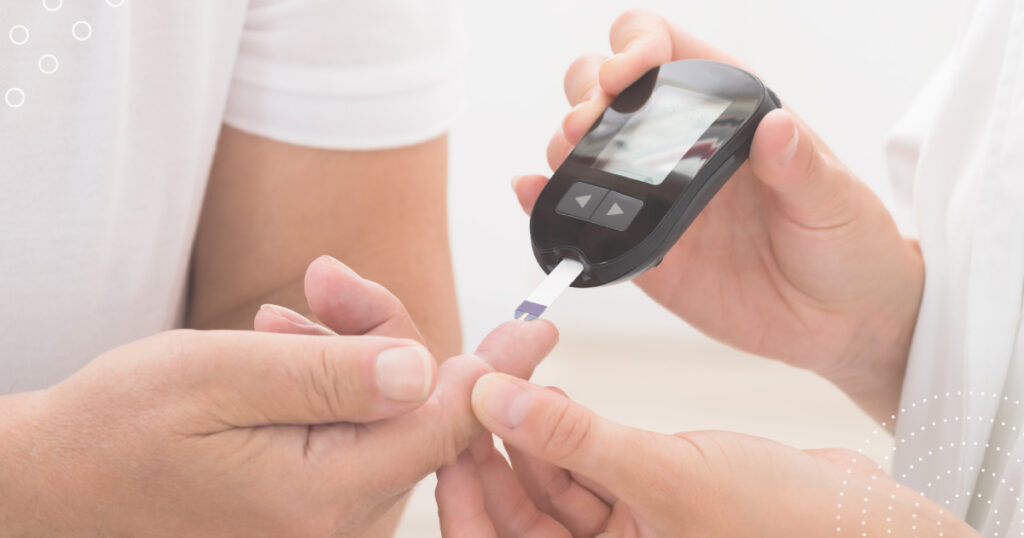
Diabetes, often called the “silent killer,” is a condition that can go unnoticed due to its subtle symptoms – making diabetes detection extremely important.
According to the Centers for Disease Control and Prevention (CDC), it’s the eighth-leading cause of death in the U.S., and shockingly, more than 7 million Americans are unaware they have it.
Diabetes mellitus refers to a group of diseases affecting the body’s ability to regulate blood sugar (glucose). Healthy blood sugar levels are below 99 mg/dL after fasting for eight hours and under 140 mg/dL two hours post-meal. Unmanaged blood sugar can lead to symptoms like intense hunger, excessive thirst, frequent urination, unexpected weight loss, fatigue, delayed wound healing, blurry vision, and irritability.
Early diagnosis of diabetes is important as timely treatment can significantly reduce the risk of complications. These complications can affect different parts of the body, including the nerves, heart, kidneys, feet, eyes, and even the mouth. Many are surprised to learn that diabetes, despite its systemic effects, can also manifest signs in the mouth. Here’s what you need to know.
Be Aware of the Symptoms of Diabetes
Talk to your doctor if you notice any of these symptoms:
Thirst and Frequent Urination
If you are always thirsty and making frequent trips to the restroom, it could be a sign of diabetes.
Fatigue
Feeling overly tired, even after a full night’s sleep? Diabetes can affect your energy levels.
Unexplained Weight Loss
Rapid and unexplained weight loss can be a red flag.
Blurred Vision
Visual disturbances, like blurry vision, should not be ignored. If you experience any of these symptoms, consult a healthcare provider for a proper diagnosis. Diabetes tests usually involve blood work and a glucose tolerance test.
How Diabetes Affects Your Oral Health
Gum Disease
Diabetes compromises your body’s ability to fight off bacteria, making you more susceptible to gum disease.
Dry Mouth
The condition may decrease saliva flow, leading to dry mouth, which can further lead to cavities.
Thrush
People with diabetes are more prone to infections, like thrush, a fungal infection that can occur in the mouth.
Bad Breath
High glucose levels in saliva can result in bad breath, often an overlooked symptom of diabetes.
Slow Healing
Mouth sores and post-dental surgery healing can take longer if you have diabetes. Let’s say you notice some bleeding while brushing or flossing. For many, it’s easy to dismiss this as aggressive brushing. However, if you have other symptoms of diabetes, gum bleeding could be a warning sign.
Make sure to keep up with regular dental check-ups for early detection of oral issues that could be related to diabetes.
Preventive Exams for Early Detection
Regular Dental Check-Ups
Visiting your Dallas dentist every six months is important. A dental professional can detect early signs of gum disease, cavities, and even oral cancer.
Blood Glucose Monitoring
If you’re at risk for diabetes, monitoring your blood glucose levels can offer essential information for early detection.
A1C Tests
A test that measures your average blood glucose level over three months, A1C is a valuable indicator of your diabetes risk.
Oral Exams
During your dental visits, request a thorough oral exam to identify any early signs related to diabetes.
Periodontal Measurements
Regular monitoring of the pockets around your teeth can help identify gum disease, which is a major indicator of diabetes.
By recognizing these signs and keeping up with regular exams, you’re taking steps towards early diabetes detection, leading to effective management of the condition. It’s a holistic approach to healthcare that’s not just about treating symptoms but also understanding interconnected risks to protect your health.
If you have any symptoms or concerns, consult your healthcare provider and your dentist immediately. Stay proactive about your health; it’s the best investment you’ll ever make.
Sources:
“What is Diabetes?” Centers for Disease Control and Prevention, https://www.cdc.gov/diabetes/basics/diabetes.html
“Diabetes Tests,” Centers for Disease Control and Prevention, https://www.cdc.gov/diabetes/basics/getting-tested.html
“Diabetes,” Mayo Clinic, https://www.mayoclinic.org/diseases-conditions/diabetes/symptoms-causes/syc-20371444
“Diabetes and Oral Health,” Centers for Disease Control and Prevention, https://www.cdc.gov/diabetes/managing/diabetes-oral-health.html
